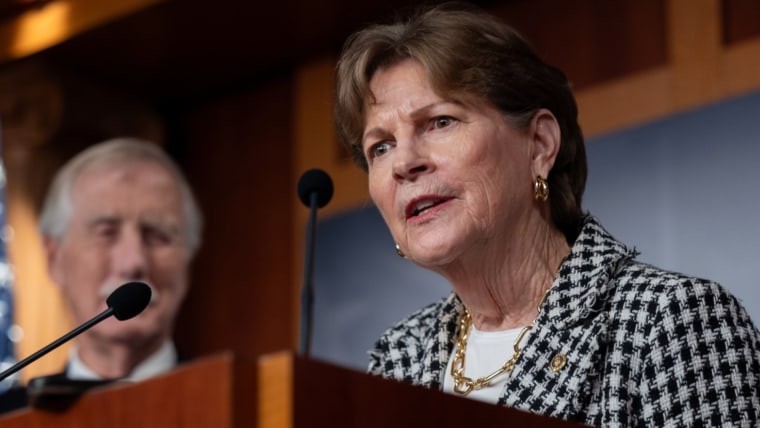From the moment Sen. Jeanne Shaheen first voted to shut down the government, the New Hampshire Democrat was on the hunt for a deal to reopen it.
Each day of the funding lapse was an exercise in frustration — one step forward, two steps back — as talks sputtered, tempers flared, expectations rose, deals fell apart and the nation’s longest shutdown dragged on.
“In my experience,” Shaheen told a small group of reporters in her office Monday, “the last foot is the hardest in a negotiation.”
The “last foot” came on Sunday, after a grueling weekend of Democratic infighting, weeks of financial pain for federal workers, and a month of what one source close to the bipartisan negotiations described as “a moveable feast” of shuttle diplomacy that was led by Shaheen, her fellow New Hampshire Democratic Sen. Maggie Hassan, and Independent Sen. Angus King of Maine.
This account of how that deal came together is based on firsthand accounts from some of the senators involved and more than a dozen Democratic aides and outside allies who spoke to MSNBC on the condition of anonymity because they were not authorized to discuss the internal negotiations.
Blame games
The partnership between Shaheen and King began almost as soon as the shutdown. After she voted against the first Republican continuing resolution and he supported it, the pair decided to work together in search of a bipartisan resolution. Over the course of six weeks and 15 failed votes, they held to those positions — until, on the 40th day of the shutdown, they helped deliver an agreement.
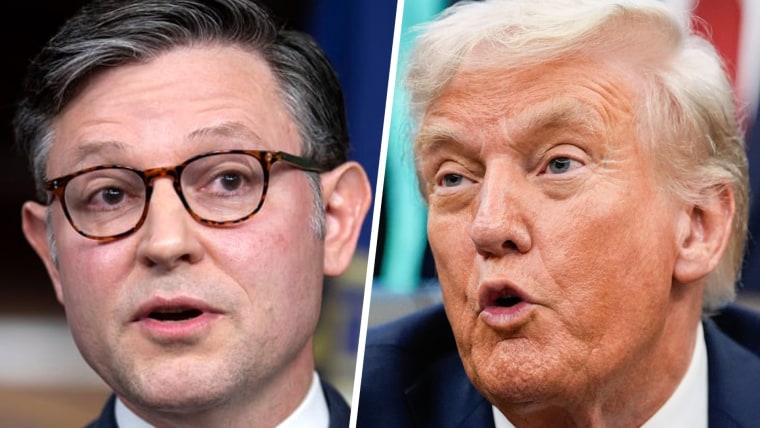
The final deal fell short of most Democrats’ central demand: an extension of expiring Affordable Care Act subsidies. But it did fund three appropriations bills through the rest of the fiscal year, extended the other nine appropriations bills through January, restored federal jobs lost during the shutdown and secured a December vote on extending those health care subsidies — a concession Senate Majority Leader John Thune, R-S.D., first floated during an MSNBC interview weeks ago.
Most lawmakers expect that vote to fail, but it will place the blame for skyrocketing premiums squarely on Republicans. Democrats are hoping the political blame may be so costly that Republicans will actually work with them to find a solution.
Either way, in Shaheen’s telling, the shutdown was effective in bringing health care to the forefront as an issue. But if the goal was actually extending the subsidies, it wasn’t working.
“We had reached a point where, I think, a number of us believed that the shutdown had been very effective in raising the concern about health care and health insurance and the need to address that,” Shaheen said Monday. “This gives us an opportunity to continue to address that going forward.”
It’s a long shot, but for the eight Senate Democrats who ultimately sided with Republicans to end the shutdown, they think it’s their best shot.
“We are going to have a bill, based on Senator Thune’s commitment — and I believe him,” Shaheen told MSNBC. “We sat across from him, looked him eye to eye, and he said this is what he would say and this is what he would do.”
Senator Schumer knew we were meeting with Senator Thune.
Sen. Jeanne Shaheen, D-N.H.
And if Thune doesn’t follow through on his commitment, Democrats always have another government funding deadline at the end of January.
That’s little comfort for most Democrats, who saw the election results last week and believed they had the upper hand on the shutdown — with President Donald Trump even privately telling Senate Republicans that the standoff had been politically worse for the GOP than for Democrats.
“Elections have consequences”
Among the many moments where negotiations fell apart — and then came back together — Nov. 4 was a major inflection point, sources told MSNBC.
The week before senators left town in advance of the off-year elections, the bipartisan negotiations looked like they were headed in the right direction. Many senators thought they were close enough to a deal that Thune should keep lawmakers in town.
But he didn’t. And days later, voters went to the polls and overwhelmingly supported Democrats.
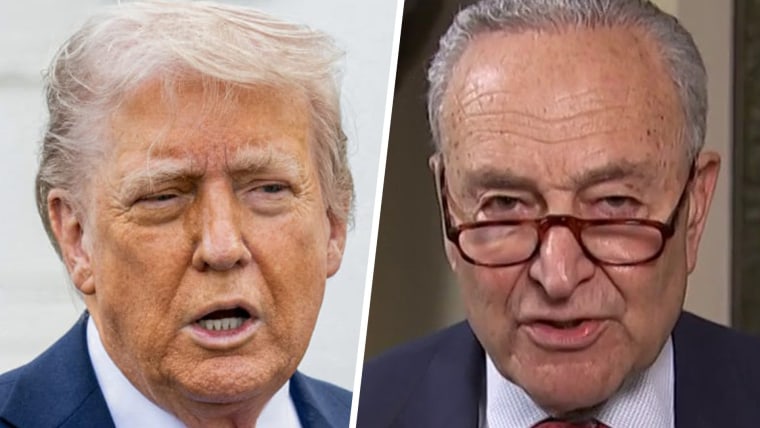
The next day, Senate Democrats arrived at their caucus-wide lunch riding high, renewed in their belief that Democrats could win this standoff.
One source described the private caucus meetings around this time as “40 Democrats saying ‘Why would we cave now? We’re winning, politically.’”
Democrats who were quietly skittish about the party’s strategy throughout the shutdown — such as Sen. Gary Peters, D-Mich. — spoke up in front of colleagues about the upside of holding firm. Peters eventually floated the idea of a one-year extension for the Obamacare subsidies, sources told MSNBC.
Only that renewed political confidence also fueled some fears. Moderate Democrats worried their party may be overreacting to the results — overreaching, according to a source close to the negotiations. If Democrats actually intended to hold out for a substantive deal on the subsidies, this shutdown could drag on for weeks more.
Shaheen, King and Hassan — “the big three,” in the words of one source — felt they needed to make progress on a deal. Fast.
To some moderate Democrats, there was a risk in making a bottom-line demand that crossed the GOP’s red line of negotiating on the subsidies while in a shutdown. Hassan asked her colleagues, according to sources familiar with the remark: “What happens if that doesn’t work?”
There didn’t seem to be a clear answer. But Democrats were desperate to try anything to break the shutdown that didn’t involve them caving.
Senate Minority Leader Chuck Schumer, D-N.Y., ultimately offered the one-year Obamacare subsidy extension on Friday as part of a larger deal to reopen the government. Almost immediately, Republicans trashed the proposal.
Their gambit had, once again, failed. But most Democrats went into the weekend thinking their party was holding strong, even as the group of moderate Democrats was preparing to take whatever deal they could.
Senate hotline
The disconnect between different Democratic factions was a major feature of this shutdown and the ultimate deal to end it. These sorts of legislative agreements are usually negotiated by leaders. This time, it was rank-and-file members freelancing with one another.
“There were a lot of conversations between those of us who were working together and our Republican colleagues,” Shaheen told that small group of reporters on Monday. “It seemed like it was important to talk directly.”
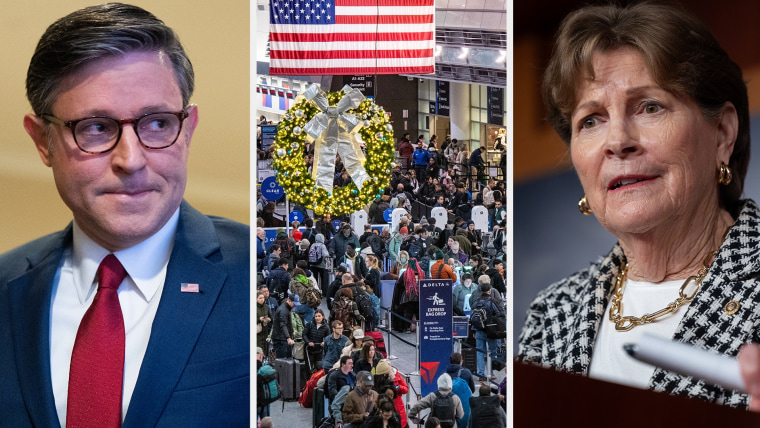
Among the Republicans Shaheen name-checked as key GOP negotiators was Appropriations Chair Susan Collins, R-Maine, as well as Sens. John Hoeven, R-N.D., and Bill Cassidy, R-La.
“Those kinds of relationships were really important,” Shaheen said, lamenting the lack of bipartisan relationships as “one of the things that we’ve lost in the Senate because it’s gotten so partisan.”
Sens. Tim Kaine, D-Va., and Katie Britt, R-Ala., proved that they may have one of those important bipartisan relationships.
Kaine has acknowledged that he was the last senator to join the group of Democratic dissenters, attracted by provisions in the deal that would reverse the administration’s layoffs during the shutdown. But it was Britt who largely made that happen.
Democrats even got an additional concession — which the Trump administration initially opposed — to constrain the White House from making additional cuts for the duration of the continuing resolution.
Asked about those provisions, a White House official told MSNBC the administration eventually backed the idea because it supported reopening the government and felt this was the best way to get that done.
But as much as these rank-and-file members were on their own, Shaheen made it clear she was keeping Democratic leaders in the loop.
“Senator Schumer knew we were meeting with Senator Thune,” Shaheen said. She started filling him in “as soon as we started meeting with Republicans” — the day after the government shut down.
Asked if Schumer was supportive of the bipartisan talks, Shaheen deflected. “I think you’d have to ask him that,” she said.
But asked if Schumer ever tried to dissuade her from these negotiations, Shaheen simply said, “No.”
The idea that Schumer gave a “wink and a nod” to this deal, however, is one that Sen. Brian Schatz, D-Hawaii, balked at.
“Oh, I can confirm that is not true,” Schatz told reporters. “I’ve been in many of those rooms, and he fought like hell against that.”
We had a victory on Nov. 4th. We have a victory that they think Trump is raising their costs — particularly on health care — and the left wing is spending all their time shooting at Democrats.”
senior democratic source
Schumer, for his part, sought to hold skittish moderate members in line for as long as he could, according to a source familiar with his efforts. He urged unity for weeks before ultimately voting “no” on the rank-and-file deal himself.
As much grief as the minority leader has taken for not controlling his caucus, the source close to Schumer suggested it was a feat that the New York Democrat ever got his members to go along with the shutdown strategy.
“They were hesitant to do it at all,” this person told MSNBC.
Without Schumer’s urging, this source said, “they would’ve abandoned ship within two weeks.”
Final passage
By Monday, as a weary Senate got ready to vote a final time on the deal, progressives were already working through the five stages of grief, moving from anger to acceptance in record time.
“It’s not like Dems didn’t get anything,” a senior progressive aide said in a conversation with MSNBC. “Politically, it’s now a more salient issue than it ever would’ve been and that matters going into an election about the cost of living and the economy.”
Multiple outside groups, who had pushed senators to hold the shutdown line, also agreed that polling and data from before and after Election Day shows Democratic voters “coming home to the party.” Public polls show voters blame Republicans more than Democrats for the shutdown.
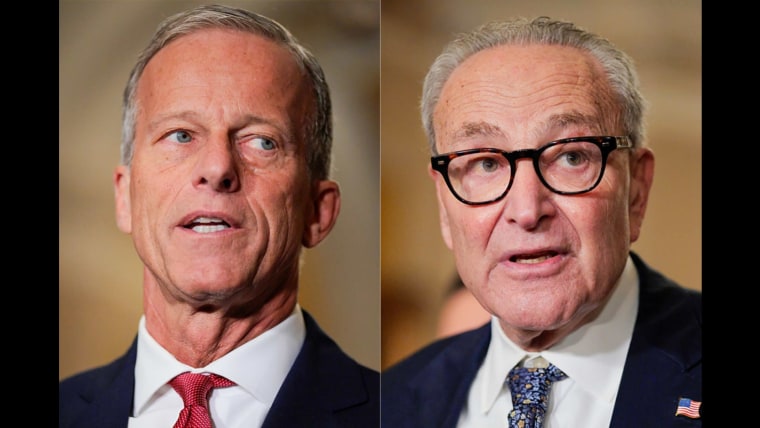
“We had a victory on Nov. 4th. We have a victory that they think Trump is raising their costs — particularly on health care — and the left wing is spending all their time shooting at Democrats,” a senior Democratic source told MSNBC. “How f------ dumb is that?”
Still, the anger is palpable — at the situation, at Republicans, at those who voted “yes,” and, notably, at Schumer himself.
The minority leader’s local New York Post likened him on Tuesday to newly fired New York Giants head coach, Brian Daboll — an Empire State insult that won’t sting as much because Schumer is a Bills fan.
Still, progressives are pushing for Schumer’s ouster. And his Senate colleagues are also upset, though none have called for his removal — at least not yet.
But Schumer has been taking fire for years. And he has proven that one of his greatest political strengths is survival, even when he offends the wrong people.
Case in point, the day after the election, Sen. Bernie Sanders, I-Vt., surprised reporters by dropping in on one of Schumer's press events, taking the opportunity to talk about the effect of the shutdown and inadvertently rail against the brewing deal.
“Always glad to have Bernie as my opening act,” Schumer quipped before beginning his planned remarks.
The following day, the Vermont senator didn’t receive an invitation to a gathering of some progressive Democrats in Schumer’s office, two sources familiar with the move told MSNBC, perceiving it to be meant as a slight. Sanders “crashed” the huddle anyway.
As the Senate closed the final vote on the deal Monday, Sanders went on MSNBC and was repeatedly pressed by Rachel Maddow on whether he supports Schumer retaining his leadership role.
“I can make the case that Chuck Schumer has done a lot of bad things,” Sanders said. “But I think, getting rid of him, who’s gonna replace him?”
